Managing international projects requires a unique approach, as these projects often span multiple countries, languages, legal requirements, and time zones. RFP platforms can significantly streamline this process, but it’s essential to understand which specific functions are necessary for effective management. Let’s explore the key features that the RFP platform should have for the successful execution of international projects.
Features of the RFP platform
Global Integration and Localization
One of the primary requirements for an RFP platform operating at an international level is the ability to integrate globally with localized processes. This means that the platform should support multiple languages, currencies, and legal standards. Localization allows companies to use a single platform to work with suppliers from various countries, while each party operates in a familiar environment.
It’s crucial for the platform to adapt processes to regional specifics, such as tax reporting requirements, legal documents, and local business standards. These features help avoid legal pitfalls and promote transparent communication among all participants.
Key RFP Platform Features for International Projects
To ensure the success of an international project, the RFP platform should provide the following capabilities:
- Multilingual Support. This is a fundamental feature for international projects. Suppliers and users from different countries should be able to operate in their native language on the platform, which enhances efficiency and reduces the risk of miscommunication.
- Multi-Currency Support. In international projects, the cost of proposals may be in different currencies. The platform should include an automatic currency converter, allowing all parties to evaluate financial proposals in their local currency.
- Legal Compliance. The platform must have built-in mechanisms to comply with local legal standards in each country where operations occur, including electronic signatures, document flow, and data protection according to legislation.
- Time Zones and Scheduling. The platform should account for time zones and allow deadline settings for different countries. This will help synchronize team efforts and avoid misunderstandings due to varying work schedules.
- Integration with Other Systems. International projects typically use various management systems, so the RFP platform should easily integrate with ERP, CRM, and financial systems to automate processes and prevent data duplication.
- Analytics and Reporting. Access to analytical tools is vital for tracking the platform’s effectiveness, analyzing proposals, and making data-driven decisions.
According to SEQUESTO, these are the key functions for international projects:
- Support for multiple languages and currencies
- Adaptation to local legal requirements
- Automatic currency conversion
- Management of time zones
- Integration with ERP, CRM, and other systems
- Advanced analytics and reporting features
Investing in an RFP platform with these functions enables companies to optimize international project management, enhance supplier interactions, and minimize risks.








